 |
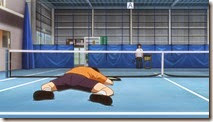 |
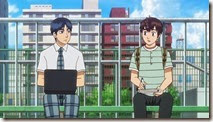 |
The source of Baby Steps‘ greatness is surely also its commercial curse.
Every young athlete’s path to becoming a professional – especially in a physically brutal sport such as tennis – passes through places that look a lot like where we saw Maruo this week. The difference is that most manga and anime about them don’t show those places. In fact in a sense Baby Steps is almost like what would happen if you sorted through all the parts that were skipped over by a standard sports manga and built a series around them. Paradoxically, I think that’s both why the series is so great and has received the highest awards in shounen manga, and why it’s not overwhelmingly popular.
Shin Gi Tai – Mind, Body and Spirit. These are the words Miura-kantoku uses to prepare Maruo for the ordeal that lies ahead, and it’s no coincidence that they’re a staple of martial arts training. Ei-chan’s ten minute match with Ike Souji has established in his mind just what the gap is between himself and a professional player – a rare opportunity most boys in his position will certainly never have, as he’s smart enough to realize. Having faced Ike across the net Ei-chan now has some idea of what his ultimate goal is, and how far away that goal is.
Ei-chan is indeed very smart, and he’s taken away more than the obvious difference in skill that exists. Ike’s body is “built differently” despite their being roughly the same size – there’s a fundamental difference not just in strength, but body construction. It’s no coincidence that Miura is so pleased that Ei-chan picked up on this – it’s the perceptiveness and attention to detail that Ei-chan possesses that gives him much of his potential. While becoming a pro is going to require intense training in all three Shin-gi-tai phases, it makes sense to start where the most improvement can be seen in the shortest time – and that’s working on the body.
As much as Miura tries to warn his pupil about how hard this training will be, there’s no preparing for the experience. It is quite literally breaking down the body and re-building it – disabusing it of any notions as to what it’s used for and training it to be that of a professional athlete. That means microfractures of the bones and inflamed muscles, oxygen starvation and crippling fatigue. Because Maruo is so freakishly old (in tennis, 16 is indeed) to be at the start of this journey, there’s no time for easing into it – Miura jumps immediately into “40-20” drills. Maruo must go full out chasing and hitting balls for 40 seconds, take a rest for 40 seconds, and repeat for a total of seven times – at which time he gets a 90-second break. And this cycle must be repeated three times. This is to simulate the rigors of an actual match, but in truth its purpose is to destroy the still-soft body of the student, and leave in its place one that’s chiseled and fit for battle. That means two months of training too rigorous to allow participation in any tournaments – the focus is entirely on breaking down and building up.
This isn’t especially pretty to watch, but it is fascinating. If there’s a moment that defines both Ei-chan and Baby Steps, it’s seeing him sleepless at 2:41 AM, literally too tired (and sore) to sleep, opening a textbook and studying English. It’s so completely unglamorous and telegenically challenged, yet it’s so classically Ei-chan and so typical of the grit that defines this series. Fortunately for Ei-chan even this brutal regimen affords the occasional day for his body to recover, and Miura invites him to accompany the coach on his trip to Osaka to support Takuma and Nat-chan in the All-Japan Junior (which is of course Ei-chan’s stated goal for next year). Normally of course this would thrill Ei-chan to no end, but he’s so exhausted that he spends the Shinkansen journey worrying about whether his body will lose recovery time because of the trip.
Watching the Baby Steps anime is always a mix of the joy and torture for fans, because as we see elements of our beloved manga on-screen at last they come with the knowledge that they’ll only be superficially explored (and act as reminders of the ones we’ll never even get to see). There are familiar faces at the All-Japan, such as Miyagawa and Oobayashi (both of whom lose in the first round) but also ones that will be new to new viewers. The most important here is Nabae Yuu (Takahiro Sakurai, a casting that I confess feels off to me though it does keep the closed circle of sports seiyuu intact – Namikawa Daisuke appeared in all three sports series today). He’s the second-seed (Takuma is fourth, Araya sixteenth), and he’s observing the fifth-seeded Kanda Hisashi, a first-year, while typing away on his laptop – though Maruo doesn’t realize who he is until Takuma shows up and makes introductions.
I won’t go into too much detail about Nabae, as he’s destined to be a bit player in the anime. But he says some interesting things here, and from the moment I read it I absolutely loved the way he described the challenge of being a tennis player – you need the be able to sprint shorter distances than a sprinter, run for longer than a marathoner, chase a ball that moves faster than professional pitcher’s fastball, the technique to execute many different shots and the control to thread a needle, all while fighting completely alone. That’s why I love playing tennis, and why tennis players are so unique among athletes (though I’m not blind to the fact that all athletes are unique).
These two different types of “Notebook-kuns”definitely see a kindred spirit in the other, and I suspect that when Nabae asked Ei-chan what he thought made a good tennis player he knew he’d approve of the answer. Nabae is a thinker like Ei-chan, an all-arounder who seeks to be an “All-A” player – becoming strong at every skill without regressing on any others. When Nabae plays casual observers are unimpressed, but he always seems to be in control of the match. In its way this too gives Maruo a roadmap, a vision of another sort of future that might be open to someone of his skills and temperament. When you’re as observant, analytical and open-minded as Ei-chan there are no such things as chance meetings – every one is an opportunity to learn something useful about yourself. And that, too, is something that’s fundamental to both Baby Steps and its protagonist and why they’re so exceptional.
 |
 |
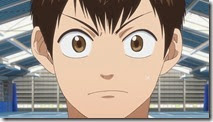 |
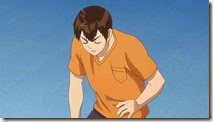 |
 |
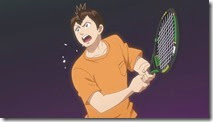 |
 |
 |
 |
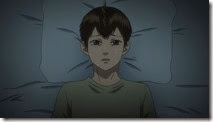 |
 |
 |
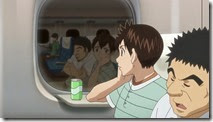 |
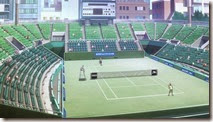 |
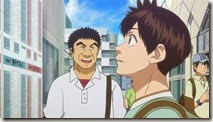 |
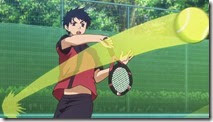 |
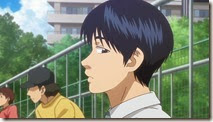 |
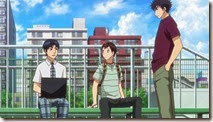 |
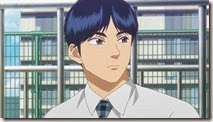 |
 |
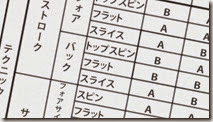 |
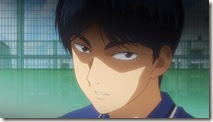 |
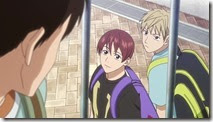 |
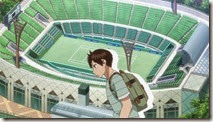 |


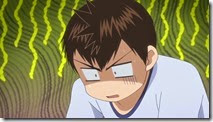
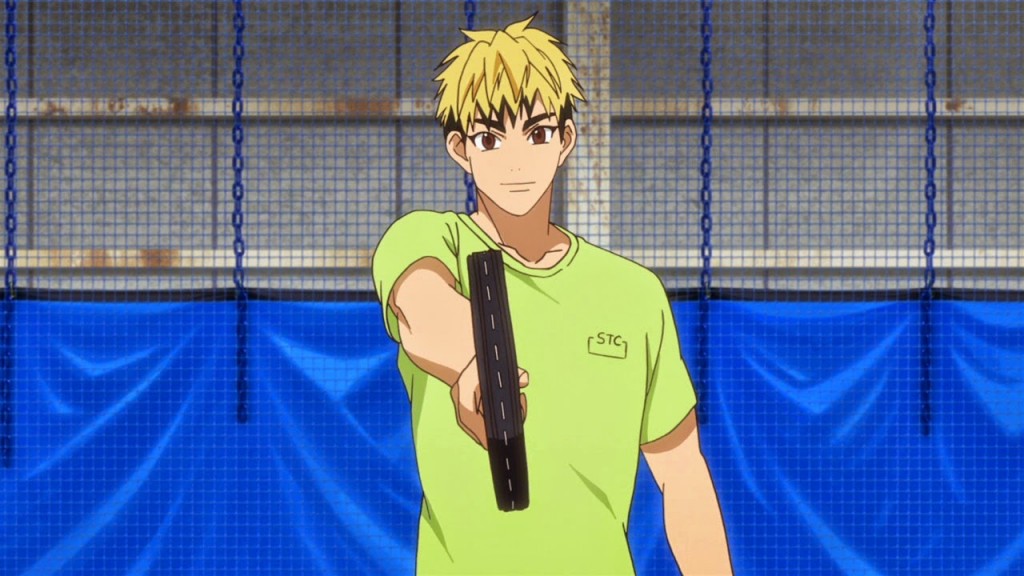

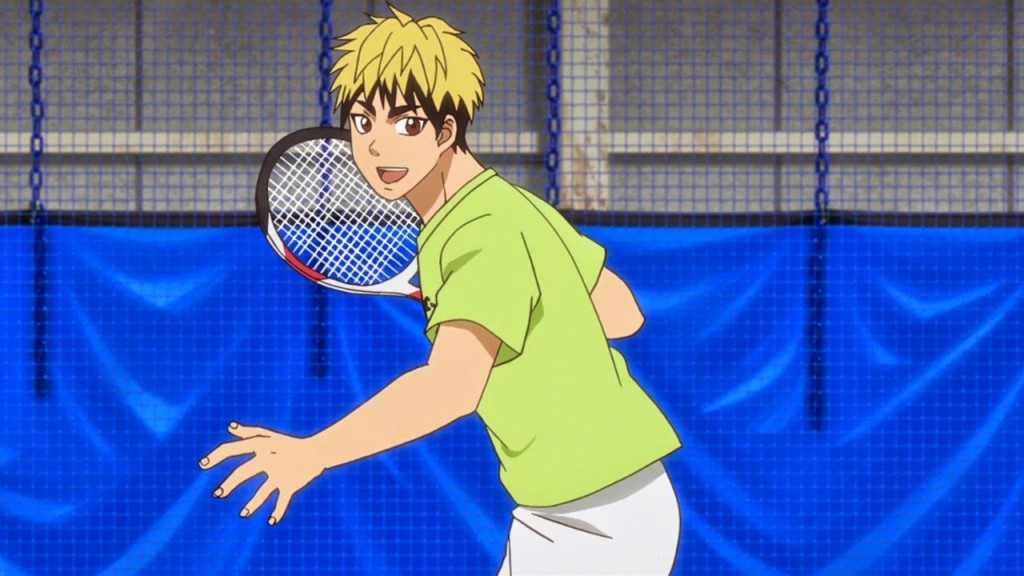
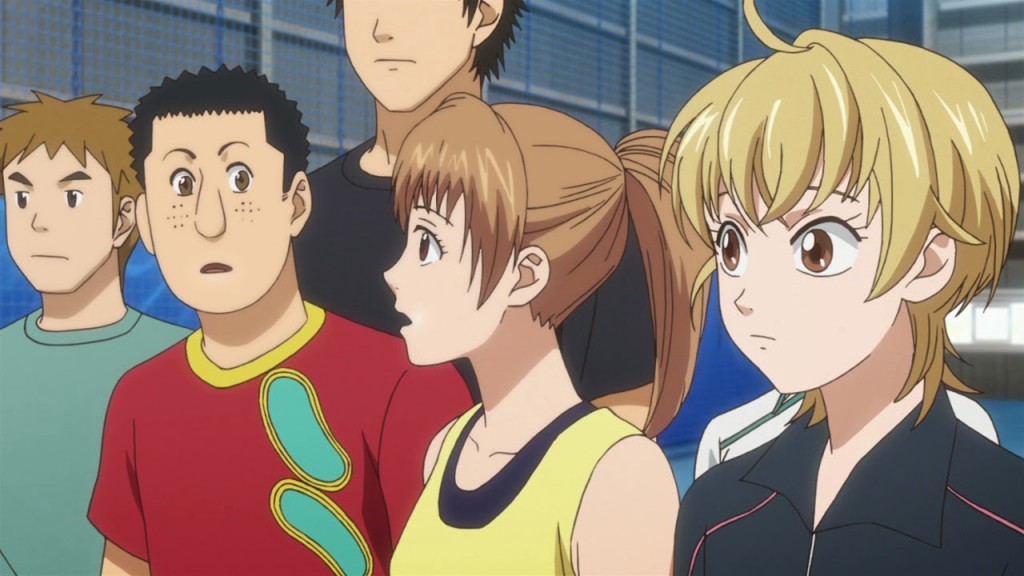
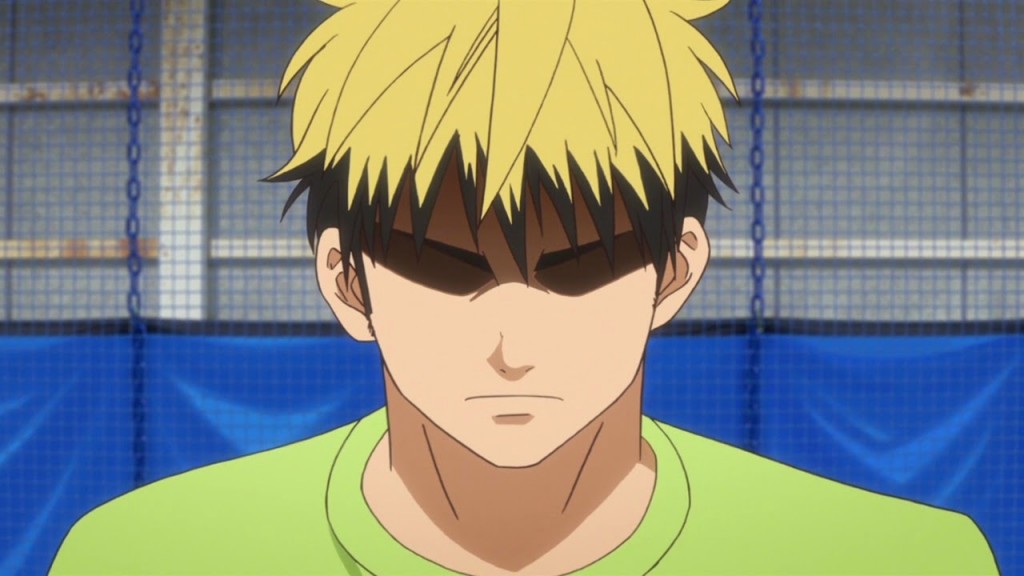
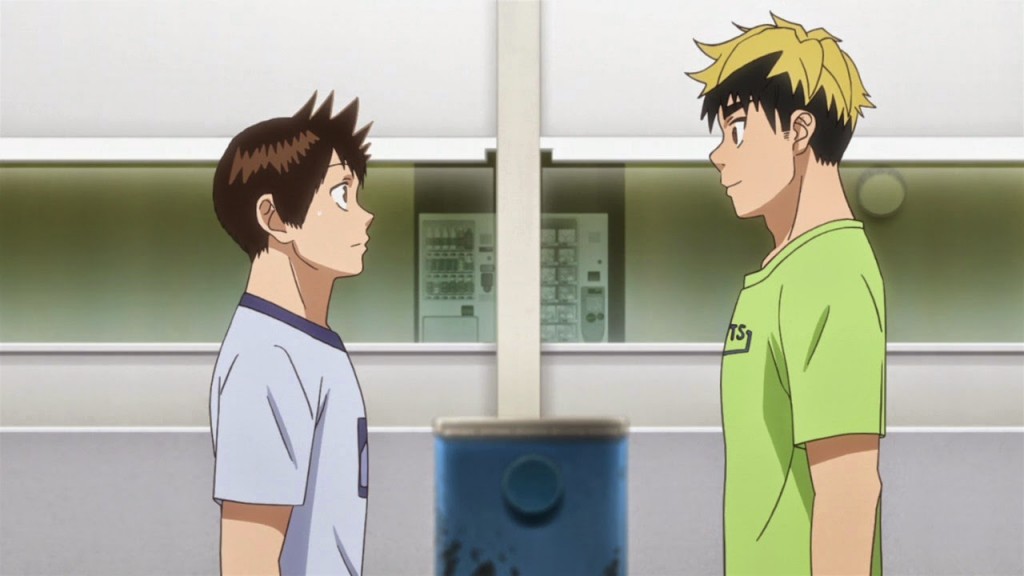
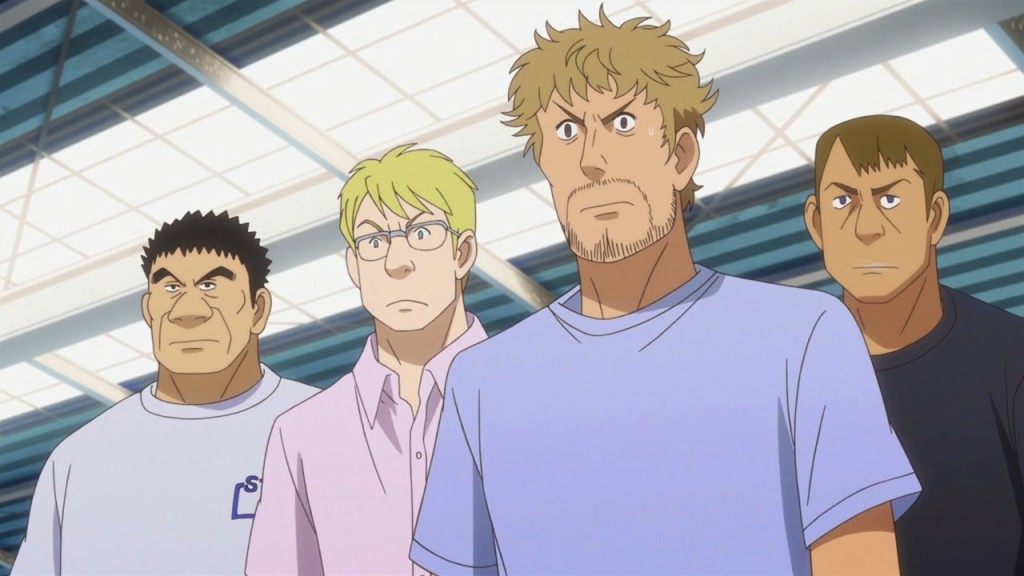
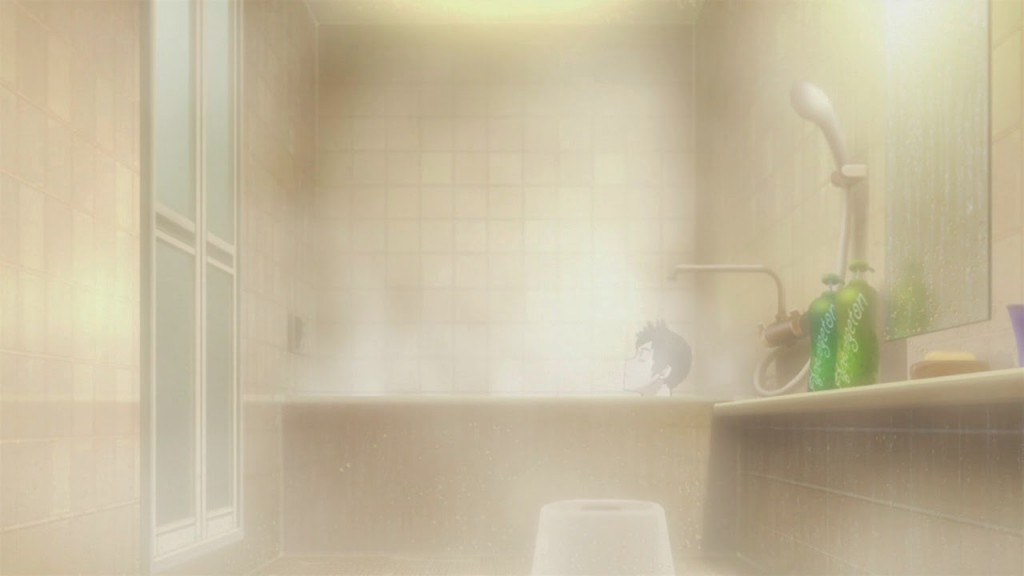


Dilys Eng
August 10, 2014 at 2:54 pmEnzo, I was wondering if you knew which chapter this would be at in the manga? I've been meaning to pick it up but I really don't want to end up spoiling myself by accidentally reading ahead 🙂
maverickmann84
August 10, 2014 at 4:44 pmNabae is introduced in Manga chapter 53 at the end so this ep ranges into 54.
gilraen_tinuviel
August 10, 2014 at 3:52 pmWhat I like in Ei-chan – not only he sees reality for what it is but constantly making a peace with it. His acceptance of his faults and staying still firm and positive it's astonishing. I quite envy him for the ability.
maverickmann84
August 10, 2014 at 4:55 pmYeah he really does have the best mindset for someone looking to get serious into sports. He doesn't have any arrogance that blinds him to what he needs to improve, he isn't too down on himself when things don't go right, he seems to keep his ability to calmly assess the situation when in trouble in a match or when assessing what he needs to do to grow, he listens to his coaches always without blindly following, he knows what he has to do when he's taken out of his game, and the list could just go on and on. To top all of that off he's a very realistic character and an incredibly likeable one. You can't help but want to cheer him on, and the slow build of his story makes his victories feel like your own. He feels almost like a kid you are coaching.
In the day of instant tweets and online posts everyone wants something that happens quick and interesting, but that's an extremely difficult thing to accomplish. We even have commercials where people say they flip out when their phone takes 20seconds to do something (not that I'm old enough to be any different). I'd argue that anything (halfway decent) that builds slow will be found interesting after enough time is invested into it. But Baby Steps is executed so perfectly that anyone willing to stick with it til now (really a few arcs ago) is really going to start seeing the payoff. And it just gets better and better too. The further Ei-chan progresses the more the reader(watcher) cares about his story. Every single arc is better than the previous arc because it all truly builds upon itself with "baby steps". If you even somewhat enjoy it now, just know that it seems to endlessly get better as it goes along.
maverickmann84
August 10, 2014 at 4:58 pmI'm starting to feel safe in regards to how the anime will be paced the whole way through. I can't see them even starting the next arc after this one. I'm thinking that the whole Wimbledon clip in the OP/ED (or wherever it was) was just a hint of his dream, not of anime events to come. Although they could also make the last bit of the last ep a huge time lead forward to when Maruo is a pro at Wimbledon, but that would be so far beyond the manga that you have no way of knowing if it'll ever line up with it.
Kurama Hitsugaya
August 10, 2014 at 9:26 pmSince you love Baby Steps so much, have you ever given Hajime no Ippo a try? I went on your Anime Planet list once, and I don't remember seeing it on there. It definitely has some WSJ moments (though no worse than Yowamushi Pedal), but it really focuses on the rigours of professional boxing; having to starve yourself to make weight, running every day until you can barely stand, intense strength training, etc. It's the closest series I've seen to Baby Steps that focuses on the training aspect of the particular sport.
admin
August 10, 2014 at 11:23 pmI have, but it's just never grabbed me. Maybe it's because I don't feel especially connected to boxing (not even when Adachi does it has it moved me in manga or anime form).
For my money, Capeta is the closest the Baby Steps in terms of the minutiae and emotional challenges of the slow training process. Also, the family side of the equation.
Hangman
August 11, 2014 at 11:53 amI wasn't that connected to boxing when I started watching Ippo (although it did really spark my interest). The technical precision in both directing and production was just so amazing I couldn't get enough. And goddamn that music was so on point. I hope you try a few more episodes one day to see that. Think of it as anime academia!
currycurry
August 11, 2014 at 1:44 amTbh, I think it's because Baby Steps is humble and doesn't take any shortcuts may be the key to its lack of success. (Well — Ookiku Furikabutte is very similar in this way but the strong ~bromantical~ elements certainly help those who would not otherwise be interested jump in.) It's these very elements that endear me to the series, but if I hadn't heard such good things from the series I probably wouldn't have gotten past the first hurtle of iffy animation and iffy protagonist design. Anime's quite a visual medium, you know? Easy to be shallow and judge by appearances.
Too, I don't think many kids in their teens would give this a try when there are so many other flashy and emotionally stimulating series around. Not that there wouldn't be any at all — know of a few myself, plus intellectual stimulation is also a thing — but… Yeah. Extremes is where it's all about, from what I remember of myself and contemporaries.
currycurry
August 11, 2014 at 1:46 amWow, this comment's a mess.
*good things about the series from you
(Not even gonna try with the rest…)